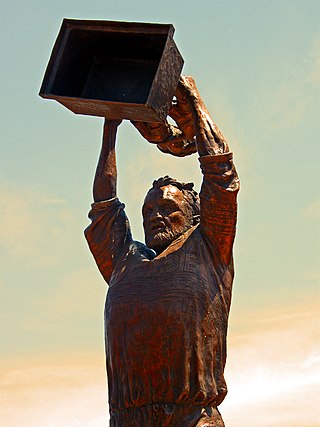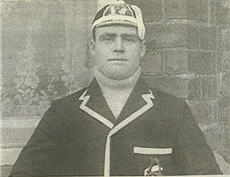Related Research Articles

Raymond Alan Price is an Australian former dual-code international rugby union and rugby league footballer. He was nicknamed “Mr Perpetual Motion” for his hard, intimidating style of play in league at lock forward. Price played rugby league for Sydney's Parramatta Eels club, with whom he won four NSWRL premierships, a Dally M Medal and a Rothmans Medal. He also played in State of Origin for New South Wales.

Michael Arthur Cleary AO is an Australian former rugby union and rugby league footballer of the 1950s, 1960s and 1970s, and a politician. He represented Australia in both rugby codes as well as in athletics making him one of only four Australians who have represented their country at full international level in three different sports. He represented as a Wallaby in six Tests in 1961 and as a Kangaroo in eight Tests from 1962.
Graham "Wombat" Eadie, is an Australian former rugby league footballer who played in the 1970s and 1980s. He has been named amongst Australia's finest of the 20th century. A New South Wales State of Origin and Australian international representative fullback, he played in Australia during Manly-Warringah's dominance of the NSWRFL competition during the 1970s. He won four premierships with them and his 1,917 points in first grade and 2,070 points in all grades were both records at the time of his retirement. Eadie also played in England for Halifax, winning the Challenge Cup Final of 1987 with them. He also won World Cups with Australia and collected awards such as the Rothmans Medal and Lance Todd Trophy.
John Brass is an Australian former rugby union and rugby league footballer – a dual-code international. He made twelve international representative rugby union appearances with the Wallabies from 1966 to 1968 and six representative rugby league appearances for the Kangaroos in 1970 and 1975, as national captain on one occasion.
Phillip Francis Hawthorne was an Australian rugby league and rugby union footballer – a dual-code international. He represented the Wallabies in twenty-one Tests and the Kangaroos in three Tests. He captained Australia in rugby league the 3rd Test of the 1970 Ashes series. His mother was killed in a car accident in Newcastle when he was 14.
Michael David O'Connor is an Australian former rugby league and rugby union footballer who represented Australia in both codes. He played for the Wallabies in 13 Tests from 1979 to 1982 and then the Kangaroos in 17 Tests from 1985 to 1990. O'Connor played club football in the NSWRL Premiership for the St. George Dragons from 1983 until 1986, and later the Manly-Warringah Sea Eagles from 1987 until his retirement at the end of 1992, becoming captain of Manly in 1990, as well as winning the 1987 Winfield Cup with the Sea Eagles.
Scott Robert Gourley is an Australian former rugby league and rugby union footballer who played from 1986 to 1998 and achieved the status of a dual-code international representing his country in both sports. He made five Test appearances for the Wallabies and switched to rugby league in 1990 playing for the St George Dragons, the Sydney Roosters and making one Test appearance for the Kangaroos.
Rex Peers "Moose" Mossop was an Australian rugby union and rugby league footballer who played in the 1940s, 1950s and 1960s – a dual-code international, and an Australian television personality from 1964 until 1991.
Richard Norman Thornett was one of five Australians to have represented their country in three sports. He was an Olympic water polo player before becoming a rugby league and rugby union player – a dual code international representative.

Lote Daulako Tuqiri is a former professional dual-code rugby footballer who primarily played as a winger across both codes. He represented Australia in both rugby league and rugby union, and Fiji in rugby league. Tuqiri first rose to prominence as a professional rugby league footballer for the Brisbane Broncos and Queensland Maroons, as well as the Fiji and Australia national sides. He was therefore a high-profile signing for rugby union in 2002, winning 67 caps for Australia and being a part of their 2003 and 2007 World Cup squads. He played rugby union for the Waratahs in the Super 14 and Leicester Tigers in England in season 2009–10. Tuqiri's contract with the Australian Rugby Union was terminated on 1 July 2009. No immediate reason was given, and Tuqiri returned to rugby league in 2010, playing for the Wests Tigers of the NRL. In September 2013, he signed a short-term contract with Irish rugby union giants, Leinster to play in the Pro12 in a three-month deal. Just 6 weeks out from the 2014 NRL season, Tuqiri signed with his third NRL club, the South Sydney Rabbitohs, on a one-year deal.

Arthur James Summons was an Australian representative rugby union and rugby league player, a dual-code rugby international fly-half or five-eighth. He captained the Australian national rugby league team in five undefeated test matches from 1962 until 1964 and later also coached the side.

Christopher Hobart McKivat was an Australian rugby union and rugby league player – a dual-code rugby international. He represented the Wallabies in over 20 Tests and tour matches from 1907 to 1909 and the Kangaroos in 5 Tests from 1910 to 1912. He is unique in Australian rugby history as the only man to captain both the national rugby union and rugby league teams. Following his playing career, he became the most successful coach of North Sydney in the club's history.
Robert Emmett Honan is an Australian former rugby union and rugby league footballer who played in the 1960s and 1970s – a dual code rugby international.
Ronald James Lisle was an Australian rugby union and rugby league player and a dual code rugby international. He represented the Wallabies in 4 tests in 1961 and the Australia national rugby league team in 13 matches on the 1963 Kangaroo tour.

Herbert R. Gilbert was an Australian rugby league and rugby union player – a dual-code international. He represented the Wallabies in three Tests in 1910 and the Kangaroos in seven Tests from 1911 to 1920, his last two as captain. The captain-coach of the St. George Dragons club in Sydney in their inaugural season, he is considered one of Australia's finest footballers of the 20th century. His sons, Herb Gilbert, Jr and Jack Gilbert were also notable rugby league footballers.
The McLean family were an Australian rugby clan who between them played 77 Tests for the Australian national rugby union team and a number of Tests for the Australian national rugby league team.
Alexander Douglas McLean Jr. was an Australian rugby union and rugby league player, a dual-code rugby international.

Charles "Boxer" Joseph Russell was a pioneer Australian rugby union and rugby league footballer and coach. He represented his country in both sports and was one of Australia's early dual-code rugby internationals. He was a gold medallist at the 1908 Summer Olympics.
Geoffrey Colin Richardson is an Australian former national representative rugby league and rugby union player – a dual-code international. He played union at fly-half and league at five-eighth.

Peter Harold Boyne Burge was an Australian rugby footballer and coach. He represented his country in both rugby league and rugby union. The eldest of the four Burge brothers, Peter was one of the first Australian dual-code rugby internationals.
References
- 1 2 3 4 5 6 7 "Profile of Steve Knight". Scrum. Retrieved 12 July 2010.
- 1 2 3 "Stephen Knight". Archived from the original on 25 July 2008.